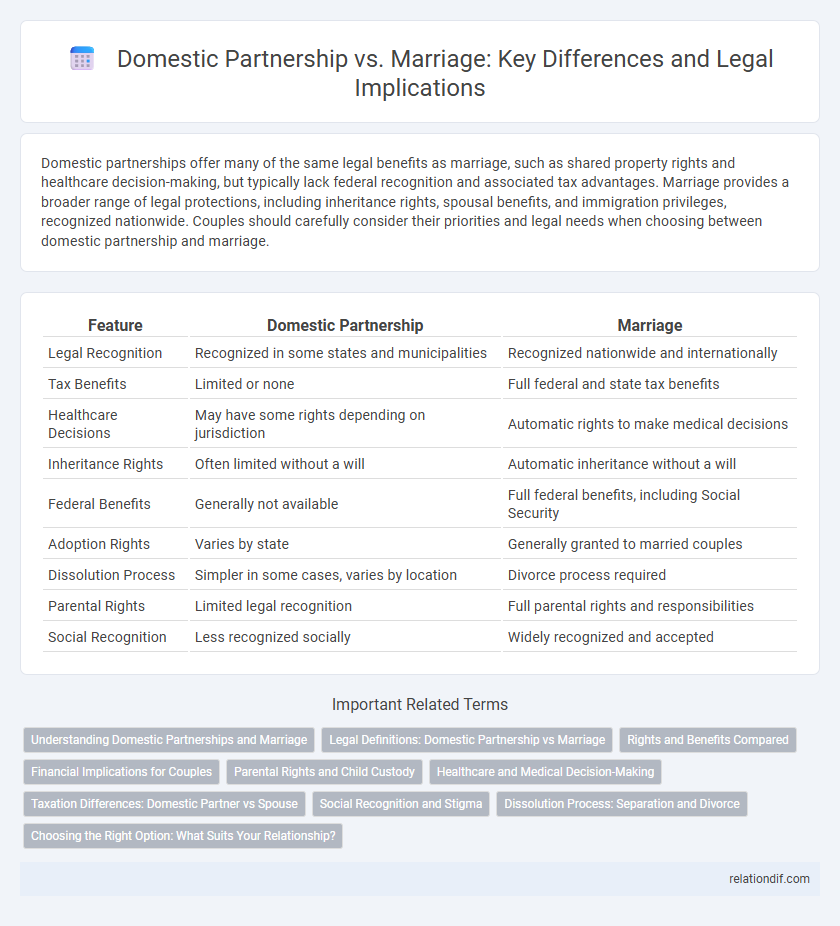Domestic partnerships offer many of the same legal benefits as marriage, such as shared property rights and healthcare decision-making, but typically lack federal recognition and associated tax advantages. Marriage provides a broader range of legal protections, including inheritance rights, spousal benefits, and immigration privileges, recognized nationwide. Couples should carefully consider their priorities and legal needs when choosing between domestic partnership and marriage.
Table of Comparison
| Feature | Domestic Partnership | Marriage |
|---|---|---|
| Legal Recognition | Recognized in some states and municipalities | Recognized nationwide and internationally |
| Tax Benefits | Limited or none | Full federal and state tax benefits |
| Healthcare Decisions | May have some rights depending on jurisdiction | Automatic rights to make medical decisions |
| Inheritance Rights | Often limited without a will | Automatic inheritance without a will |
| Federal Benefits | Generally not available | Full federal benefits, including Social Security |
| Adoption Rights | Varies by state | Generally granted to married couples |
| Dissolution Process | Simpler in some cases, varies by location | Divorce process required |
| Parental Rights | Limited legal recognition | Full parental rights and responsibilities |
| Social Recognition | Less recognized socially | Widely recognized and accepted |
Understanding Domestic Partnerships and Marriage
Domestic partnerships provide a legal framework for couples, often granting limited rights compared to marriage. Marriage is a legally recognized union with comprehensive rights and obligations under family law, including property, inheritance, and spousal benefits. Understanding the distinctions between domestic partnerships and marriage is essential for couples assessing legal protections and social recognition.
Legal Definitions: Domestic Partnership vs Marriage
Domestic partnership is a legally recognized relationship between two individuals who live together and share a domestic life but are not married. Marriage is a legally binding contract recognized by state and federal law, granting spouses comprehensive rights, responsibilities, and benefits. Unlike marriage, domestic partnerships often provide limited legal protections related to healthcare decisions, inheritance, and taxation, varying significantly by jurisdiction.
Rights and Benefits Compared
Domestic partnerships often grant limited legal rights compared to marriage, typically covering health insurance and hospital visitation but lacking comprehensive benefits like joint tax filing and inheritance rights. Marriage provides extensive legal protections including spousal Social Security benefits, pension rights, and automatic parental rights. Couples in domestic partnerships may face challenges securing rights related to property division, immigration, and decision-making authority during medical emergencies.
Financial Implications for Couples
Domestic partnerships often provide limited financial benefits compared to marriage, such as restricted access to spousal health insurance, tax breaks, and inheritance rights. Married couples typically qualify for federal tax benefits including filing jointly and estate tax exemptions that aren't granted to domestic partners. Legal recognition of marriage also simplifies financial decision-making in areas like retirement benefits, social security, and medical emergencies.
Parental Rights and Child Custody
Domestic partnerships often provide limited parental rights compared to marriage, affecting legal recognition of both partners as parents. Marriage grants automatic parental rights and stronger protections in child custody cases, ensuring equitable decision-making and child support obligations. Courts typically favor married couples in custody disputes due to clearer legal frameworks underpinning parental responsibilities and rights.
Healthcare and Medical Decision-Making
Domestic partnerships often provide limited healthcare benefits compared to marriage, which typically guarantees spousal access to employer-sponsored health insurance and medical decision-making rights. Married couples possess legally recognized authority to make critical healthcare decisions for an incapacitated spouse, a privilege that domestic partners may lack without additional legal documentation. Ensuring healthcare proxies and medical power of attorney can bridge the gap for domestic partners, but marriage inherently simplifies these protections under state law.
Taxation Differences: Domestic Partner vs Spouse
Domestic partners often face different tax treatment compared to spouses, as federal tax law typically recognizes only legally married spouses for benefits such as filing jointly and claiming spousal exemptions. Domestic partners may not qualify for tax advantages like filing jointly or claiming the earned income tax credit, resulting in potentially higher tax liabilities. State tax laws vary, with some states granting domestic partners similar tax status as spouses, but federal tax obligations remain distinct, impacting income reporting and benefits.
Social Recognition and Stigma
Domestic partnerships often lack the widespread social recognition afforded to marriage, leading to varying levels of acceptance across different communities. Marriage is traditionally regarded as a formal, legally and socially validated union, which can reduce stigma and affirm the relationship's legitimacy. Despite growing acceptance of domestic partnerships, many individuals still encounter social stigma due to perceived ambiguity about the partnership's status and commitment.
Dissolution Process: Separation and Divorce
Domestic partnership dissolution typically involves a simpler separation process without court-mandated divorce proceedings, often allowing partners to divide assets and resolve disputes privately or through mediation. In contrast, marriage dissolution requires a formal divorce process that includes legal filings, possible court hearings, and adherence to state-specific divorce laws governing asset division, alimony, and child custody. The complexity and duration of marriage divorce proceedings generally exceed those of ending a domestic partnership, reflecting the broader legal recognition and obligations involved in marriage.
Choosing the Right Option: What Suits Your Relationship?
Domestic partnerships offer flexible legal recognition and often include rights related to healthcare and property without the formalities of marriage, making them suitable for couples seeking less traditional commitments. Marriage provides comprehensive legal protections, tax benefits, and societal recognition, ideal for those prioritizing long-term stability and shared responsibilities. Evaluating personal values, financial goals, and legal needs helps determine whether domestic partnership or marriage best aligns with your relationship's priorities.
Domestic Partnership vs Marriage Infographic

 relationdif.com
relationdif.com